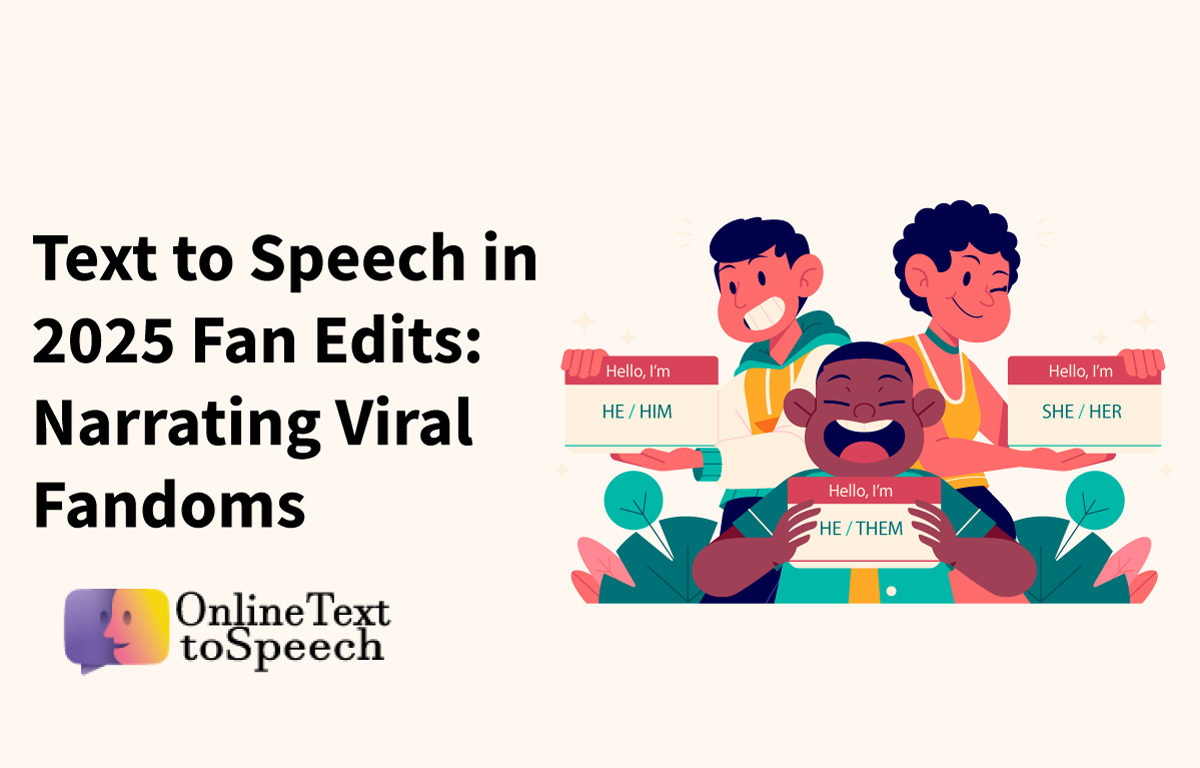TikTok, once the platform for dance challenges and lip-syncs, is now shaping the future of storytelling through audiobook shorts. These bite-sized narrated stories are rapidly dominating the “BookTok” community, attracting millions of views and opening a new creative gateway for authors and content creators. At the core of this revolution is text to speech, transforming the way narratives are delivered.
While traditional audiobooks require voice actors and long production timelines, today’s creators are turning to AI for seamless, high-quality narration. With a growing appetite for short-form, binge-worthy storytelling, audiences are embracing this audio-driven trend faster than ever before.
As we explore this evolving landscape, it’s clear that the creative possibilities of text to speech free tools are only just beginning to unfold, especially for indie writers and monetized influencers who rely on quick, scalable content.
How AI Text to Speech Is Fueling TikTok’s Storytelling Culture
The rise of audiobook shorts on TikTok is inseparable from the accessibility of AI text to speech platforms. What once took hours in a studio can now be generated in minutes with precision, emotional intonation, and multilingual capabilities. Creators no longer need to narrate their own stories; instead, they upload a script and select from various natural-sounding voices.
These platforms allow for consistency, which is especially important when building a series. Viewers get used to the tone and voice, leading to higher engagement and returning audiences. Plus, the time saved in production helps creators maintain a regular posting schedule, a crucial aspect of TikTok’s algorithmic success.
In this environment, text to speech online isn’t just a tool—it’s a creative partner that democratizes storytelling and redefines production workflows for social-first authors.
Why Short-Form Audiobooks Are the Perfect Fit for Modern Audiences
Our attention spans are shrinking, and digital consumption habits are evolving. TikTok’s vertical, fast-paced content structure has made it ideal for creators to present 30–60 second story snippets that capture interest immediately. These snippets often end on a cliffhanger, pushing users to follow the series or visit external links.
By leveraging text to audio free technology, creators can narrate chapters without needing expensive equipment or voice talent. That levels the playing field for indie authors and new influencers entering the digital publishing world. What once required a publisher and a budget now just needs a solid script and the right voice tool.
As audiences grow more accustomed to synthesized voices, they’re appreciating the convenience and speed over celebrity narrators or dramatized renditions. The format shift is less about polish and more about connection—getting a compelling story to people, fast.
The Impact of Free Online Text to Speech on Content Accessibility
Accessibility is one of the most powerful byproducts of this audio trend. With free online text to speech platforms, content becomes inclusive for people with visual impairments or reading disabilities. TikTok’s popularity among Gen Z and millennials includes a demand for inclusive, user-first content—and TTS plays a major role here.
A user with dyslexia can enjoy a mystery story without having to read subtitles. Someone multitasking during a commute can listen rather than scroll. These tools remove friction in content consumption and widen the audience reach exponentially.
In fact, many creators are now tagging their videos with #audiobookshorts and #readtok, indicating a growing culture around short-form audio narratives. This is no longer a fringe trend—it’s a digital publishing shift that’s inclusive by design.
How a Text to Voice Generator Enhances Creative Experimentation
Experimenting with different voices, accents, and tones used to be restricted by budget or access to voice talent. But now, with any modern text to voice generator, creators can test dozens of narrative styles instantly.
Need a gritty male voice for a dystopian drama? Or a soft, empathetic tone for a love story? AI voice platforms let creators switch voices mid-series, adjust pacing, or add emphasis for emotional impact. This opens up incredible room for creative freedom.
Many are even beginning to use distinct voices for different characters, turning short stories into rich, immersive experiences—all without leaving their laptop. This is especially useful when engaging with TikTok’s algorithm-driven audience, where novelty and pacing can make or break a post’s reach.
Above all, the adaptability of these tools supports diverse storytelling, helping creators find their voice—sometimes quite literally.
Using Text to Speech Voices to Build a Recognizable Audio Brand
As content creators seek to build loyal followings, having a consistent voice matters. Think of how YouTubers are recognized by their intros; TikTok creators are starting to establish similar auditory identities using text to speech voices.
Creators are now strategically selecting voices that resonate emotionally with their story themes. Horror creators might use deep, robotic tones. Romance authors may opt for gentle, melodic narrations. With TikTok users often watching with audio on, these voice choices are crucial for brand recognition.
Once a creator finds the voice that clicks with their audience, it becomes part of their storytelling DNA. And since these voices can be reused and replicated, creators don’t have to worry about losing continuity, something vital when producing serialized content.
What Makes a Great Text to Speech Generator for TikTok Creators?
There are countless options available today, but not all TTS tools are created equal. For creators looking to jump on this audiobook shorts trend, features like speed control, natural inflection, and downloadable audio files make all the difference.
A standout text to speech generator should also support multi-language input, especially since TikTok has a massive international audience. Some creators now localize their stories into multiple languages using AI voices, expanding their reach without re-recording anything.
One of the best tools for such use cases is an online Text to speech generator, which provides high-quality AI narration, ease of use, and supports a range of voices ideal for storytelling. Whether you’re posting daily shorts or launching a full mini-series, this platform simplifies audio production significantly.
Why TikTok’s Algorithm Loves Narrated Storytelling Content
TikTok rewards content that holds viewers’ attention, and narrated videos do just that. Story-based content—especially with voiceovers—is proven to boost watch times, retention, and shares.
When creators use text to speech free services, they’re able to push out consistent, high-engagement videos that meet TikTok’s algorithmic preferences. These videos are not only watched but rewatched and saved, thanks to their captivating nature and ease of listening.
Narration brings life to static scripts. A simple text story can be good, but with voice, it becomes cinematic—especially when paired with visuals and subtitles. It’s no surprise that this format is driving millions of views across #BookTok and related niches.
Text to Speech Online Tools Are Helping Monetize TikTok Book Creators
Monetization on TikTok is no longer limited to brand deals or the Creator Fund. Writers and audio creators are finding new income streams through Patreon, Ko-fi, paid subscriptions, and book sales—all driven by short-form narrated content.
Thanks to text to speech online technology, creators can produce dozens of short episodes quickly, offer exclusives to paying fans, and build anticipation through serialized storytelling. What starts as a 60-second hook on TikTok can convert into full book sales or audiobook subscriptions.
More creators are realizing that professional-quality audio is no longer a luxury; it’s a necessity to scale. TTS tools provide that production power without the overhead.
The Rise of AI-Generated Audiobooks: Not Just for Social Media
Although TikTok is the epicenter, this storytelling trend is spilling into platforms like Instagram Reels, YouTube Shorts, and even Spotify. Some creators use AI text to speech to generate entire audiobooks and then chop them into bite-sized videos for marketing.
Others build entire branded series where users can binge short chapters in minutes. This kind of content meets the needs of the modern consumer—quick, mobile-first, and emotionally engaging.
It’s clear that TTS is no longer a backend tool for accessibility; it’s a front-end innovation driving the next era of narrative content.
Text to Audio Free Tools Are Making Publishing Frictionless
In the past, publishing a story—even just audio—required a publisher, narrator, editor, and marketer. Today, with the help of text to audio free services, creators can take control of the entire pipeline.
From drafting a script to generating narration to scheduling TikTok posts, creators now operate like full-fledged media studios—often from their bedrooms. The speed and flexibility this offers are revolutionary, especially for creators who can’t afford full production teams.
And since many of these tools offer commercial usage rights, creators don’t have to worry about licensing or takedowns. It’s storytelling, on your own terms.
Final Thoughts: The Future of Text to Speech on TikTok and Beyond
What began as an accessibility solution has now evolved into one of the most creative tools for digital storytelling. Text to speech isn’t replacing traditional narrators—it’s empowering a new wave of authors, influencers, and video creators to share their stories more easily and widely than ever.
As TikTok and similar platforms continue to favor engaging, narrated content, the use of high-quality TTS tools will only grow. Whether you’re an aspiring novelist, an audio influencer, or a marketer with a knack for storytelling, now is the time to leverage this evolving format to connect, captivate, and grow.
FAQs
It converts written content into spoken audio using AI-generated voices.
Yes, many creators use TTS tools for audiobook-style storytelling on TikTok.
Absolutely. It offers quality narration with minimal effort and cost.
Look for one with natural voices, speed control, and export options.
Yes, several platforms offer free TTS features with premium upgrades.




